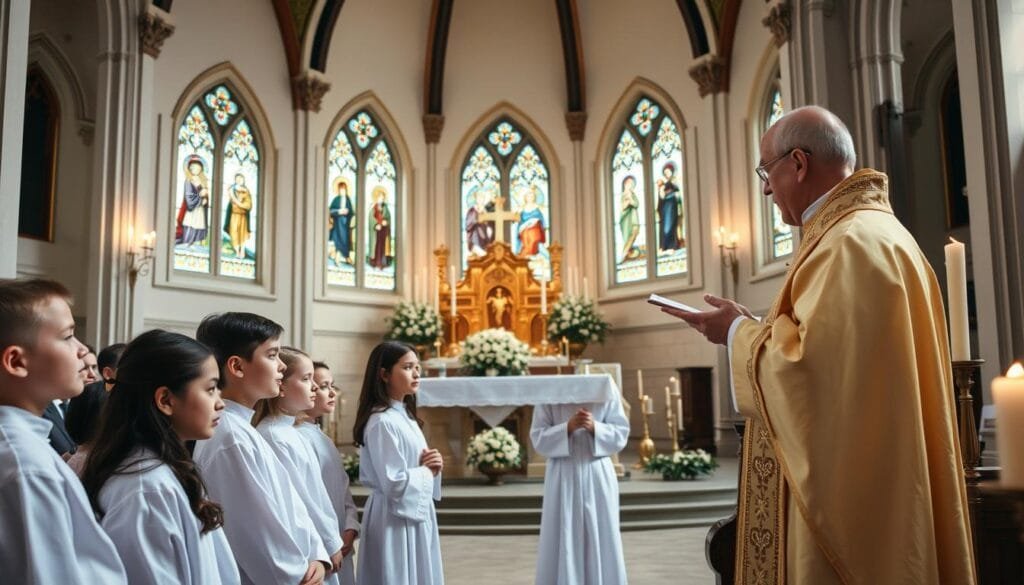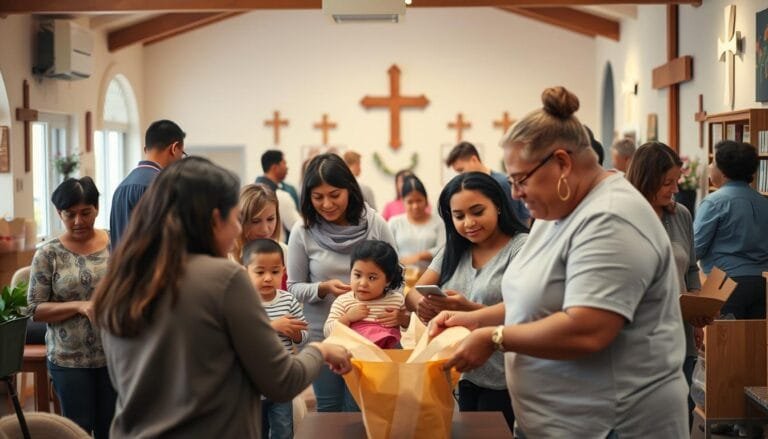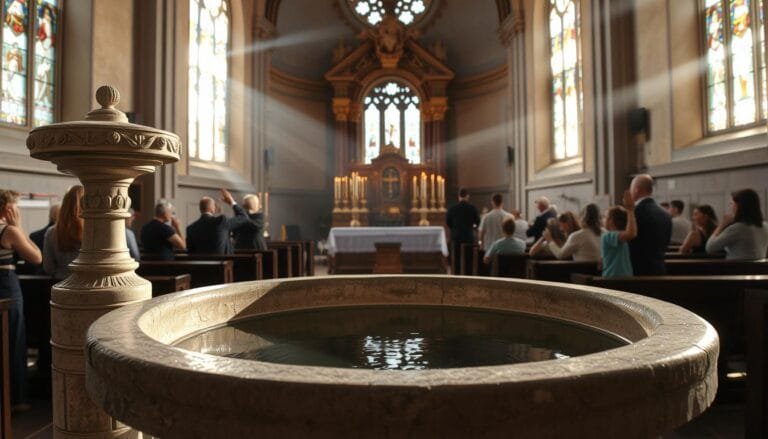How to Get Confirmed Catholic: A Guide to the Confirmation Process
This website contains affiliate links. As an Amazon Associate, I earn from qualifying purchases. The content on this website was created with the help of AI.
Catholic confirmation is a key moment in one’s faith journey. This sacrament is a vital part of spiritual growth.
Let’s explore what being confirmed Catholic involves and how to embrace this sacred tradition.
The sacrament of confirmation completes Christian initiation in the Catholic Church. It’s a time to renew baptismal promises and receive Holy Spirit gifts.
This step deepens one’s bond with God and the Church community.
Candidates prepare spiritually and mentally for confirmation. They study Church teachings and reflect on their faith. A sponsor is chosen to guide them through the process.
A bishop usually leads the confirmation ceremony. This highlights the link between the apostles and the wider Church.
America’s confirmation history features inspiring figures like Elizabeth Ann Seton. As the first American-born Catholic saint, she shaped Catholic education in the U.S.
Her devotion to faith and service embodies the spirit of confirmation.
Key Takeaways
- Confirmation completes Christian initiation in the Catholic Church
- The process involves spiritual preparation and learning about Church teachings
- A bishop usually presides over the confirmation ceremony
- Candidates choose a sponsor to guide them through the process
- The sacrament is typically celebrated during Mass to highlight its connection to the Eucharist
- Elizabeth Ann Seton’s life exemplifies the spirit of Catholic confirmation in America
Understanding the Sacrament of Confirmation in Catholic Faith
Confirmation is a key Catholic sacrament that enhances spiritual growth. It strengthens our bond with the Church and deepens our baptismal grace.
Let’s explore its significance, history, and the Holy Spirit’s role.
The Spiritual Significance of Catholic Confirmation
Confirmation is typically received around age 12, marking a milestone in our Catholic journey. This sacrament empowers us to spread the Gospel.
It helps us live out our Christian calling with renewed purpose.
Historical Context and Evolution of the Sacrament
Confirmation has deep roots in apostolic tradition. While practices have changed, the core elements remain intact.
Pope Pius X lowered the age for first communion to about 7 in the early 1900s.
Today, confirmation often follows baptism, penance, and communion in the initiation process. This order helps believers build a strong foundation in their faith.
Role of the Holy Spirit in Confirmation
The Holy Spirit plays a central role in confirmation. During the ceremony, the bishop or priest anoints the forehead with chrism oil. They say, “Be sealed with the gift of the Holy Spirit.”
This invocation brings wisdom, understanding, counsel, fortitude, knowledge, piety, and fear of the Lord. These gifts help us grow in faith and serve others.
| Gifts of the Holy Spirit | Fruits of the Holy Spirit |
|---|---|
| Wisdom | Charity |
| Understanding | Joy |
| Counsel | Peace |
| Fortitude | Patience |
| Knowledge | Kindness |
| Piety | Goodness |
| Fear of the Lord | Faithfulness |
Through confirmation, we fully embrace our faith. We commit to living as Christ’s witnesses in the world. This sacrament marks a significant step in our Catholic tradition.
How To Get Confirmed Catholic: A Guide To The Confirmation Process
Catholic confirmation is a vital step in one’s faith journey. This guide will explore the key aspects of this important sacrament.
We’ll cover preparation, ceremony details, and the significance of confirmation.
Requirements and Preparation for Confirmation
Confirmation prep usually takes two years of active participation in parish programs. This involves catechesis and spiritual formation, deepening understanding of Catholic beliefs and practices.
Candidates engage in community service projects. This gives them hands-on experience of their role within the Church.
Choosing a Confirmation Sponsor
Picking a Catholic sponsor is crucial for the confirmation process. Sponsors must meet specific criteria:
- Be at least 16 years old
- Fully initiated Catholics (baptized, confirmed, received First Eucharist)
- If married, in a valid Catholic marriage
- Actively involved with the candidate
- Participate in a retreat
- Adhere to Safe Environment standards
The Confirmation Ceremony Steps
The confirmation ceremony is a beautiful Catholic ritual within Mass. Key steps include:
- Presentation of candidates by a pastor or catechist
- Renewal of baptismal promises
- Laying on of hands by the bishop
- Anointing with Chrism oil

The Anointing with Chrism and Its Meaning
The Chrism oil anointing is a powerful moment in the ceremony. The bishop makes the cross sign on each candidate’s forehead with oil.
He says, “(Name), be sealed with the gift of the Holy Spirit.” This act symbolizes the Holy Spirit’s gifts and the candidate’s faith commitment.
“The Sacrament of Confirmation strengthens the baptized and obliges them more firmly to be witnesses of Christ by word and deed and to spread and defend the faith.”
These steps make candidates fully initiated Church members. They’re now ready to live their faith with renewed purpose and vigor.
Conclusion
Catholic Confirmation has a rich 2000-year history. It’s a pivotal moment in Christian life with deep spiritual significance. This sacrament profoundly impacts one’s Catholic faith journey.
Confirmation plays a crucial role in spiritual growth. It’s a transformative experience that deepens our connection to the Catholic community.
The preparation, sponsor selection, and liturgical planning make this sacrament meaningful.
Confirmation isn’t an endpoint, but a beginning. It marks the start of a lifelong faith journey. It empowers us to live out our beliefs more fully.
Let’s embrace the gifts of the Holy Spirit. We can actively engage in our parishes and continue growing in faith. Together, we can build a vibrant Catholic community that reflects Christ’s love.






